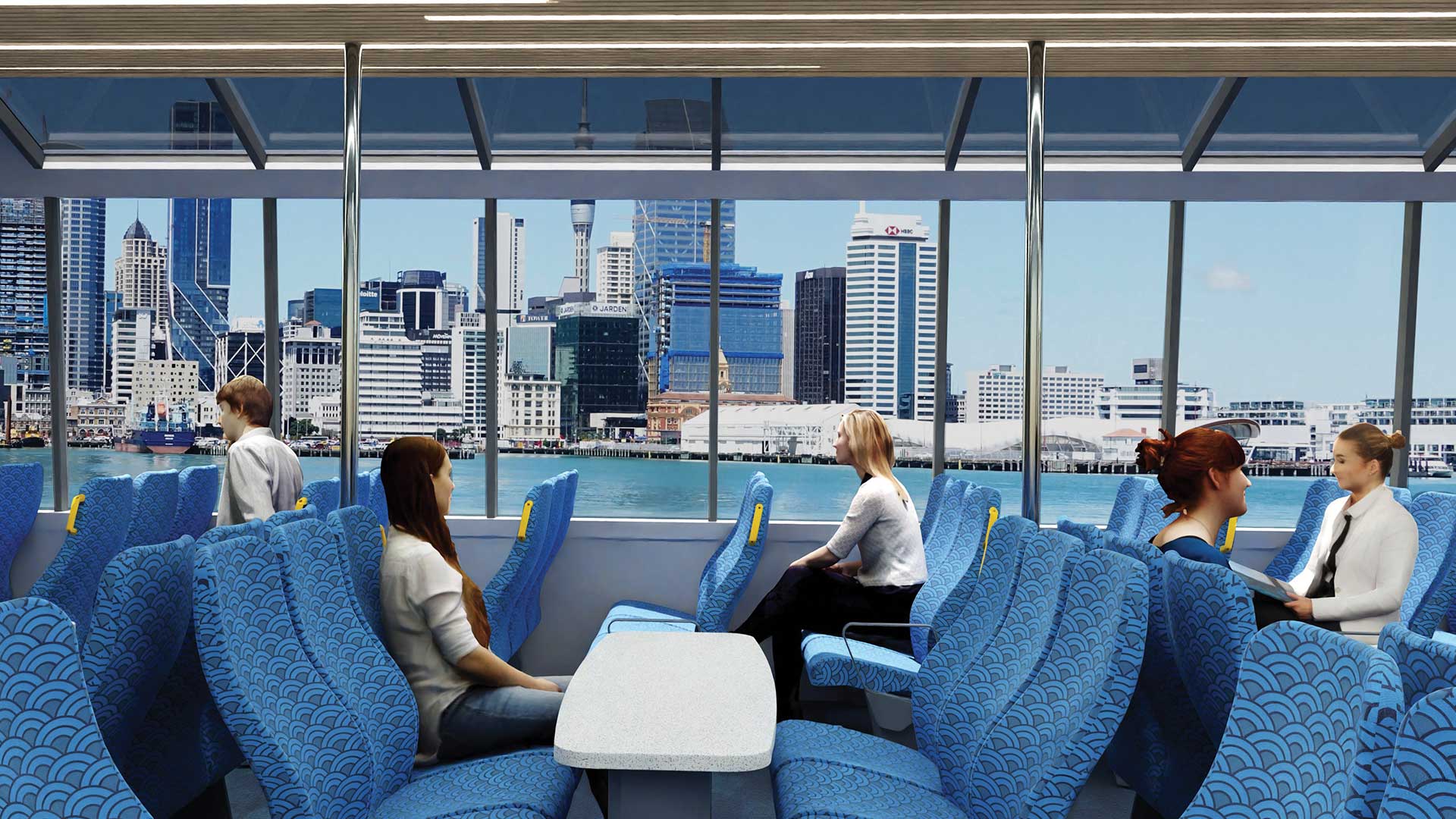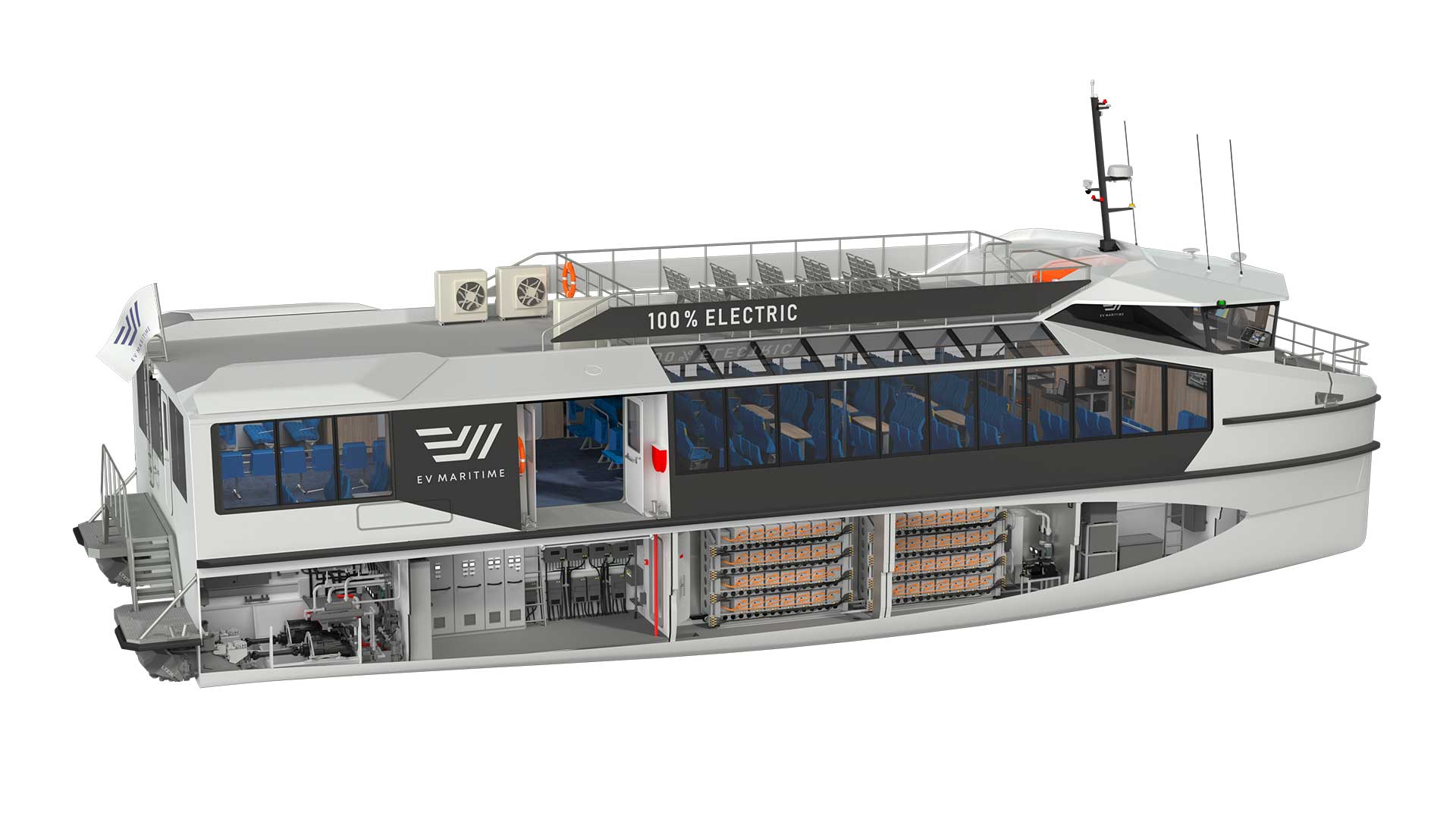EV Maritime: Pioneering the Electric Ferry Revolution
Electric vehicles are becoming the new norm on land, and now EV Maritime has emerged as a leader of the transition to cleaner transportation on water. The brainchild of NZ innovator Michael Eaglen, EV Maritime sets out to decarbonise the maritime industry with its innovative approach to electric ferries.
Eaglen has a background in boat design ranging from military patrol boats to super yachts, coupled with expertise in advanced composite materials and America’s Cup. That background instilled in him a deep understanding of innovation and a drive for performance and efficiency. He recognised the opportunity to bring those principles into the inshore commercial maritime sector and how they could provide the foundations of the change needed to decarbonise that high-emissions sector. However he quickly identified the conservatism of that diesel-dominant industry and realised the need to take matters into his own hands.
“Diesel is easy and convenient, but it’s dirty, noisy, smelly and it has allowed industry to forget its roots.”
“What I’m on about here”, he continues, “is that in the ‘old days’, labour was cheap and materials were expensive. We worked hard to build boats efficiently. Globalisation and industrialisation changed that. It became cheaper to install a bigger motor than to build an efficient boat. Electric brings back the imperative of efficiency: motors and batteries are expensive, charge time is downtime: wasting energy is punished.”
Starting in 2018 EV Maritime embarked on a journey challenging conventional wisdom by creating traditionally capital-intensive assets with minimal capital. “There just wasn’t time to wait for someone to ask for electric ferries. We took matters into our own hands, built a core team of engineers, started developing boats without a client, and explaining why they were so important,” Eaglen explains. This Kiwi mindset of determination and resourcefulness proved to be a crucial advantage for the company.

So how do you assess the demand for a product category that doesn’t yet exist that no one’s heard of and no one’s asking for?
“A lot of it is that ability to get in front of prospects and influential industry organisations where you can deliver value. If you can deliver value and help them meet their goals then it’s not really a sales process. It’s a partnering process”, says Eaglen.
The COVID-19 pandemic presented an unexpected opportunity. With passenger numbers plummeting across various forms of transport, dashing their hopes of selling any ferries in the short term, Eaglen seized the moment to partner with electricity lines company Vector and ferry operator Fullers 360 to showcase a shovel-ready project to a government eager to stimulate innovation and employment.
What would have been an landmark technology pilot became a global exemplar when EV Maritime converted this funding into a contract with Auckland Transport (AT), marking the beginning of an ambitious ferry decarbonisation programme across the wider Auckland fleet.
Auckland Transport, responsible for keeping public transport running smoothly in New Zealand’s largest city, recognised the potential of electric ferries in advancing their vision of a sustainable and livable city. The scale and ambition of the project quickly saw its importance recognised globally as Eaglen took the EV Maritime story around the world. Industry and government representatives from across the globe have been eager to visit and see the project first-hand.
“This is much more than electrifying yesterday’s ferries. The way we see it, electric ferries represent more than just a shift in propulsion technology,” Eaglen explains. “Our role is not just to decarbonise boats, but to support a clean, reliable, affordable and attractive public transport system to encourage commuters out of their cars.”
Ferries face unique challenges that are different to EV cars. Lack of regeneration opportunity and high power requirements for charging are key among them. EV Maritime addresses these challenges with innovative solutions, including embracing still-in-development megawatt charging technology and real-time operational insights enabled by sensor technology. The energy demands for ferries is very different to buses for instance, “Running a ferry for a day is a bit like driving a full bus up hill for 18 hours”, says Michael.

It’s pretty interesting to compare some stats for marine ferries to what you use in traditional electric cars. Charging rates are two or three megawatts with a battery capacity of over a megawatt hour! Compare that to a typical road car with a charging rate of 100 kilowatts, that’s 1/30th of the charging speed. At these rates, electric ferries can get most of their charge while loading and unloading passengers at the end of each trip.
EV Maritime’s commitment to sustainability goes beyond zero emissions. By designing ferries with scalability in mind, utilising componentized boats that share features across the fleet, CEO Michael Eaglen transforms a maritime construction and design company into a data-driven enterprise. With the integration of sensors collecting thousands of data points per cycle, the company seeks to revolutionise preventative maintenance in the inshore maritime industry. This wealth of data empowers the company to monitor every vessel on the water, analyse performance metrics, and continuously refine software and design for future enhancements as the fleet and business grow. This holistic approach ensures not only the efficient operation of individual vessels but also the optimization of the entire fleet, driving innovation and sustainability forward.
Looking ahead, EV Maritime aims to leverage its success in New Zealand to expand into international markets. “Our vision is to help boat builders around the world to become electric boat builders and to support operators and government agencies to buy from them. With an international network of build partners we can really scale our decarbonisation impact globally,” Eaglen notes.
Being a pioneer in the electric ferry industry comes with its challenges, but for Eaglen, it’s a journey worth embarking on. “It’s hard work, but it’s exciting. I wasn’t prepared to wait,” Eaglen remarks. “I really can’t imagine it being any other way.”

